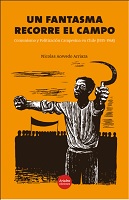Un fantasma recorre el campo
Comunismo y politización campesina en Chile (1935-1948)
| dc.contributor.author | Acevedo Arriaza, Nicolás | |
| dc.date.accessioned | 2023-03-21T10:39:14Z | |
| dc.date.available | 2023-03-21T10:39:14Z | |
| dc.date.issued | 2023 | |
| dc.identifier.uri | https://library.oapen.org/handle/20.500.12657/61959 | |
| dc.description.abstract | The following book seeks to answer some of these questions, above all because, unlike the labor movement, little is known about the politicization of peasants at the beginning of the 20th century. In general, the investigations have described the process of worker politicization, mentioning the fundamental role played by the political parties, be it the Democratic Party, the Socialist Workers Party and the anarchist movement in the "awakening of the workers". On the other hand, they have described that the relationship between political parties and social movements was characterized by the limited autonomy of the latter around the former. This included the peasant movement, especially in its early years. But in recent decades, a series of studies have shown that agricultural workers were not "marginalized" or "absent" from national politics, but rather, the first peasant organizations were repressed and limited in their union activity, especially among the years 1938-1952 | en_US |
| dc.language | Spanish | en_US |
| dc.subject.classification | thema EDItEUR::N History and Archaeology::NH History::NHK History of the Americas | en_US |
| dc.subject.other | Chile, peasantry, politics, political organization | en_US |
| dc.title | Un fantasma recorre el campo | en_US |
| dc.title.alternative | Comunismo y politización campesina en Chile (1935-1948) | en_US |
| dc.type | book | |
| oapen.identifier.doi | 1026448/ae.9789569645143.65 | en_US |
| oapen.relation.isPublishedBy | f6cb5ffd-d9ed-409f-b6f8-71eb0272e363 | en_US |
| oapen.pages | 264 | en_US |
| oapen.place.publication | Santiago, Chile | en_US |

